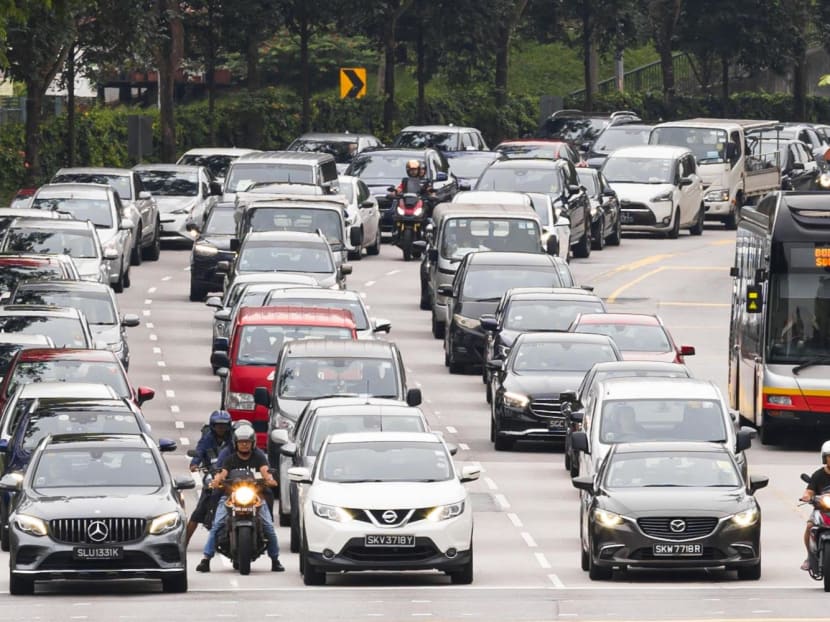COE supply increase unlikely to cause significant price drop or deluge of cars on roads: Analysts
SINGAPORE — The increase in supply of Certificates of Entitlement (COE) for Category A and B vehicles is unlikely to result in a significant fall in COE prices or an increase in the number of cars on the roads, thereby causing congestion, transport analysts and car dealers said on Monday (May 8).

- Transport Minister S Iswaran said that the authorities will bring forward and redistribute the supply of five-year COEs that are due to expire
- The move will increase the quota supply for small cars in Category A by 24 per cent, and large cars in Category B by 15 per cent, for the remaining bidding exercises in the May to July quarter
- Transport analysts and car dealers said that this increased supply is unlikely to cause COE prices to fall or increase the number of cars on the roads
- They likened this one-off move to a “cooling measure” that is aimed at stabilising the market
SINGAPORE — The increase in supply of Certificates of Entitlement (COE) for Category A and B vehicles is unlikely to result in a significant fall in COE prices or an increase in the number of cars on the roads, thereby causing congestion, transport analysts and car dealers said on Monday (May 8).
Rather, the analysts and dealers interviewed by TODAY likened the one-off move to a “cooling measure” that is aimed at stabilising the market.
Speaking in Parliament on Monday, Transport Minister S Iswaran announced that the Land Transport Authority (LTA) will bring forward and redistribute the supply of five-year COEs that are due to expire in the next projected supply peak.
The move will involve the redistribution of about 6,000 COEs over several quarters — starting from the May to July quarter — and aims to reduce supply volatility amid record-high COE prices.
This will increase the quota supply for small cars in Category A by 24 per cent, and large cars in Category B by 15 per cent, for the next five bidding exercises up to July.
INCREASE IN COE SUPPLY JUST A ‘COOLING MEASURE’
The differentiated increase in quota for small and big cars will affect both markets differently, Mr Neo Tiam Ting said.
The president of the Singapore Vehicle Traders Association, who described the latest move as a “cooling measure”, said this means that while there may be “some impact” on Category A COE prices in the next bidding exercise, for Category B, it will be “quite difficult” for prices to go down by as much as 10 per cent.
Asked if the move announced by Mr Iswaran will lead to COE prices possibly falling as low as they were in 2018 and 2019, the analysts said that this is unlikely due to growing demand for cars, coupled with the Government’s zero-growth rate policy for cars and motorcycles.
Looking at past COE quotas, close to 40 to 50 per cent of demand is still not met, Associate Professor Raymond Ong said.
The associate head of research in the department of civil and environmental engineering at the National University of Singapore (NUS) added that this shows there is pent-up demand for Cat A and Cat B COEs.
The 24 per cent and 15 per cent increase in quota for these categories, respectively, still falls short of the pent-up demand, he said.
Associate Professor Walter Theseira, a transport economist from the Singapore University of Social Sciences, said: “I do not think (policymakers) expect this move to bring prices significantly down, because to get the kind of prices people remember from the late 2010s — before the run-up in COE prices — you need a doubling or more of the available COE quota supply, not an increase of 10 to 20 per cent.”
MINIMAL IMPACT ON TRAFFIC CONGESTION
The increase in COE supply is also expected to have minimal impact on the absolute number of cars on the road and is thus unlikely to cause a significant rise in traffic congestion.
While there would be a temporary small increase in the number of cars on the road, this is likely to translate to just a 1 per cent increase in cars overall, given that the projected number is only 6,000 COEs to be distributed over the next few quarters, Assoc Prof Theseira said.
Furthermore, it is not a permanent increase, and the overall number of cars will shrink again as the five-year extended COE cars are deregistered and not replaced, he added.
Mr Neo from the Singapore Vehicle Traders Association said: “If we talk about 6,000 (redistributed COEs) against 950,000 for today’s population, I think the impact is very, very small.”
He pointed out that the number of cars to be scrapped in the next quarter has also not been announced.
LTA'S INITIATIVE LIKELY A ‘ONE-OFF’
Ultimately, the initiative is expected to be a one-off move, as the transport experts and car dealers noted that the Government is effectively borrowing from future COE quotas.
Dr Ivan Png, distinguished professor of strategy and policy and economics at the NUS Business School, said: “(This borrowing from future quotas) cannot be done indefinitely without permanently increasing the number of cars on the road, which the Government has committed not to do.”
Mr Raymond Tang, managing director of car dealership Yong Lee Seng Motor, said that the redistribution of COE supply may help in lowering prices for now, but repeatedly drawing from the future will be “abnormal”.
Assoc Prof Theseira believes that it might be worthwhile for policymakers to build on the concept to permanently redistribute COEs from years when the supply is high to periods when the supply is low.
He said that the current 10-year COE cycle, where some years have more than double the COE supply of other years, is not efficient.
“It doesn't allow our vehicle fleet to be renewed on a regular basis, to take advantage of technological improvements, and it doesn't match underlying demand, which is likely to be more continuous across years rather than concentrated in only a few years.
"It also creates issues for the industry, particularly mass market car dealers.”
The longer-term problem, Assoc Prof Theseira added, is that the way COEs are distributed across the years still does not necessarily meet the needs of the economy and society.
“I still believe some fundamental revisions to how vehicles are taxed and controlled in Singapore is needed, and a review of the COE system, in conjunction with the next-generation Electronic Road Pricing system, may open up better ways to regulate and price vehicle use in Singapore.”













